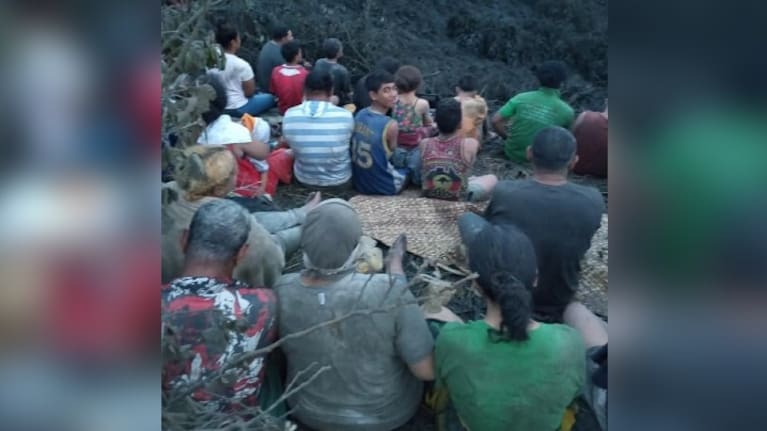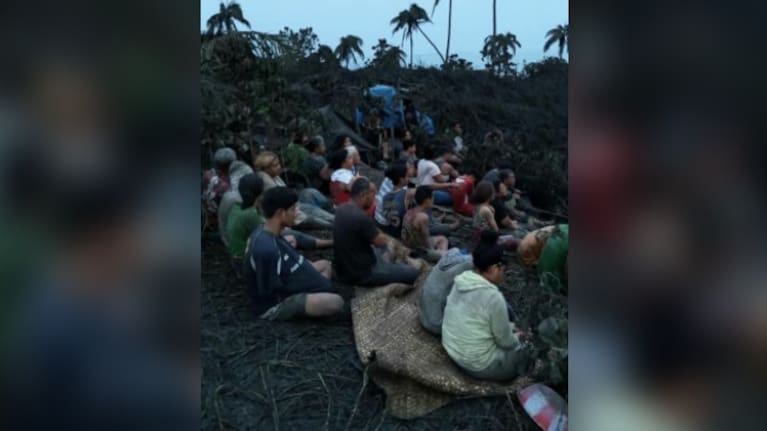1News Pacific Correspondent Barbara Dreaver reflects one year on from the devastating Hunga Tonga Hunga Ha’apai eruption and tsunami in Tonga.
"We are in a precarious situation. You will forgive the wobble in my voice because we’ve had a very frightening hour. There was enormous cracks from the volcano shaking, rumbling, cracking, a series of huge explosions and then about 15 minutes later, the tsunami waves started coming into Nuku’alofa waterfront. The first ones were the biggest."
On January 15, 2022, local journalist Mary Fonua gave this harrowing account live on 1News, describing what was happening outside her waterfront home and office.

Twenty minutes earlier I had phoned Mary, a long-time friend and colleague of 30 years, after getting messages from other friends in Nuku’alofa telling me the Hunga Tonga Hunga Ha’apai volcano was erupting and police were driving around the coastline urging people to evacuate in case of a tsunami. Knowing both her and her publisher husband Pesi live on the waterfront, I frantically rang her and my first words were, “Get out, Mary!” But she replied it was too late and she could see their car washing up against their two-storey home.

Mary’s live cross to 1News, along with some videos that some residents had been able to post before communications went down, spoke to the gravity of what was unfolding.
The eruption was later revealed as being the most powerful in the 21st century so far, shooting ash 57 kilometres into the sky and triggering a tsunami that reached a height of up to 15 metres.
There were three deaths – a miracle there weren’t more given the severity of the disaster – and around 75% of the population were impacted.
Families living overseas were desperate for news of their loved ones but all communication was down for days, raising levels of anxiety and fear. For the next few days I got dozens of heartbreaking messages from New Zealand Tongans frantically asking for help and wanting news of family members, some of them elderly and living alone. But it was days before anyone could contact them and it took five weeks to restore the internet. It was during that time that the vulnerability and isolation of Tonga was most evident.

A year on some businesses have not recovered, including the Vakaloa Beach Resort which lies in ruins. Speaking in an interview, owner John Tuku’afu said, "I thought the world was coming to an end". For the Tuku’afu family and residents living in the hard-hit coastal village of Kanokupolu, it’s meant a loss of income and daily living remains tough there.
While the estimated cost of damages is NZ$285 million there are other, less obvious impacts.
When the Pasifika Medical Association sent a team to assess and check on mental health it found widespread trauma, especially among children. In just one week the team provided support for 500 people, with many more in need of help. Post-traumatic stress disorder (PTSD) amongst the population is still present today.

Residents from islands like Mango and Atata, which were wiped out, have not been able to return home and will forever live with displacement. When they were first evacuated to the mainland Tongatapu, many of them in shock. Journalist Marian Kupu described them as refugees.
"Their faces, the sadness, the confusion that you can see within them – they look lost," she said.
In August cameraman Sam Walters and I got a special permit and travelled to Atata Island accompanied by a police officer and sisters Akosita Kristen Irwin and Suliana Fusikata. When they stepped off the boat onto the sands of Atata there was a long period of silence as they silently wept looking at the devastation.
"Emotional. This is where I grew up" and "it really hurts" were the first words out of their mouths.

But several hours later when we headed back to the boat, they were already talking about rebuilding one day and there was a strength and purpose to their stride.
Such is the resilience in the Kingdom.


















SHARE ME